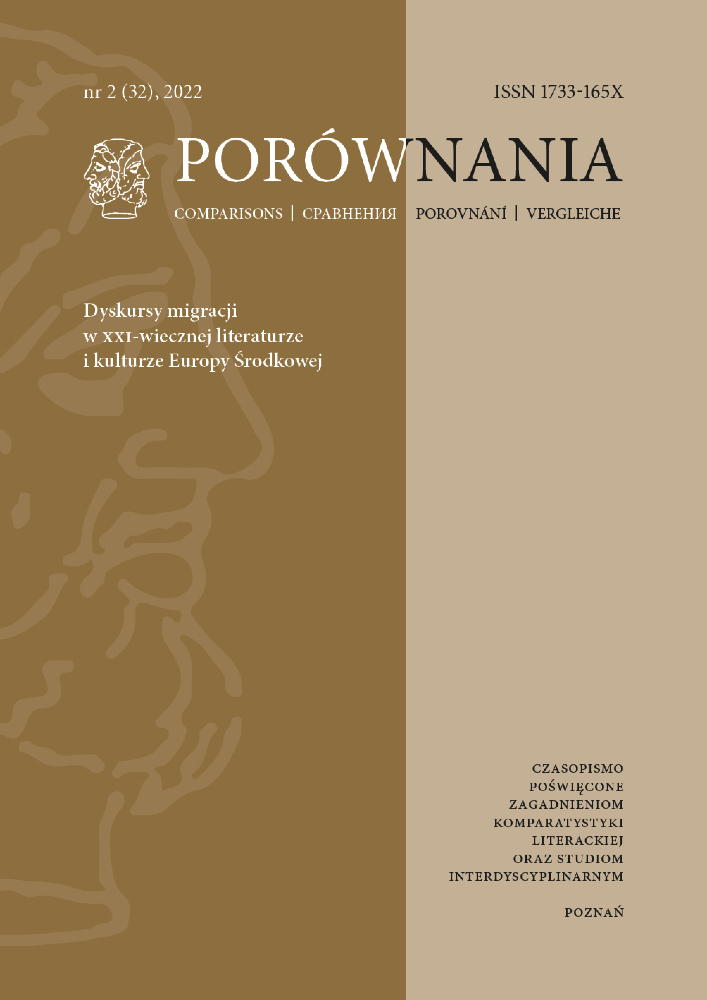Abstract
Canadian ethnic literature has been dominated by testimonies of migrant experience for a long time. Writers of Eastern European extraction, such as Janice Kulyk Keefer, Eva Hoffman, Eva Stachniak, Lisa Appignanesi or Elaine Kalman Naves to mention just a few, have contributed to the vast body of Canadian migrant literature, giving voice to the quandaries of white, invisible minority migration. As it turns out, the latest texts published by Polish-born Canadian women writers also address the issues of migration and the memory of Communist Poland, which the writers left in the 1980s and early 1990s. The aim of this paper is to look at three selected texts: Giant (2012) by Aga Maksimowska, Lemons (2017) by Kasia Jaronczyk and Was It Worth It. Columbus in Jeans (2019) by Liliana Arkuszewska, all of which are debut novels, and discuss their perception and rendition of Communist Poland, which the authors left behind physically and simultaneously struggled to free from mentally. The narratives chosen for this study, despite substantial differences, bear certain similarities in their treatment of Poland as well as become important commentaries on the status of migrant discourses in North America.
References
Agnew, Vijay. “Introduction.” Diaspora, Memory and Identity: A Search for Home. Toronto: University of Toronto Press, 2005. 3–17. DOI: https://doi.org/10.3138/9781442673878 DOI: https://doi.org/10.3138/9781442673878
Arkuszewska, Liliana. Was It Worth It? Columbus in Jeans. Trans. Charles S. Kraszewski. Kibworth Beauchamp: Matador, 2019.
Bodal, Ewa. “‘Nie Możesz Stać w Dwóch Różnych Miejscach’: Polska, Kanada i Tożsamość Narodowa w Powieści Giant Agi Maksimowskiej [‘You can’t have your feet in two different places’: Poland, Canada and National Identity in Giant by Aga Maksimowska].” Niuanse Wyobcowania: Diaspora i Tematyka Polska w Kanadzie. Ed. Anna Branach-Kallas. Toruń: Wydawnictwo Naukowe Uniwersytetu Mikołaja Kopernika, 2014. 147–62.
Boelhower, William Q. “The Immigrant Novel as a Genre.” MELUS 8.1 (1981): 3–13. DOI: https://doi.org/10.2307/467364 DOI: https://doi.org/10.2307/467364
Borkowski, Andrew J. “Giant.” A Transatlantic Review of Things Polish, in English, 2013. cosmopolitanreview.com/giant/. Accessed 2 Feb. 2022.
Bouson, Brooks J. Embodied Shame. Uncovering Female Shame in Contemporary Women’s Writings, New York: SUNY Press, 2009.
Brah, Avtar. Cartographies of Diaspora. Contesting Identities. New York and London: Routledge, 2005. DOI: https://doi.org/10.4324/9780203974919 DOI: https://doi.org/10.4324/9780203974919
Brownlie, Siobhan. “The Roles of Literature and the Arts in Representing the Migrant and Migration.” Figures of the Migrant. The Roles of Literature and the Arts in Representing Migration. Ed. Siobhan Brownlie and Rédouane Abouddahab. New York and London: Routledge, 2022. 3–20. DOI: https://doi.org/10.4324/9781003176213-2 DOI: https://doi.org/10.4324/9781003176213-2
Erll, Asrid. “Locating Family in Cultural Memory Studies.” Journal of Comparative Family Studies 42.2 (2011): 303–318. DOI: https://doi.org/10.3138/jcfs.42.03.303 DOI: https://doi.org/10.3138/jcfs.42.3.303
Hall, Stuart. “Cultural Identity and Diaspora.” Theorizing Diaspora. A Reader. Eds. Jana Evans Braziel and Anita Mannur. Malden, MA and Oxford and Carlton: Blackwell Publishing, 2008. 233–246.
Jaronczyk, Kasia. Lemons. Toronto: Mansfield Press, 2017.
Kozaczka, Grażyna J. Writing the Polish American Women in Postwar Ethnic Fiction. Athens: Ohio University Press, 2019. DOI: https://doi.org/10.2307/j.ctv224tvmg DOI: https://doi.org/10.2307/j.ctv224tvmg
Kristeva, Julia. Powers of Horror. Essay on Abjection. Trans. Leon S. Roudiez. New York: Columbia University Press, 1982.
Maksimowska, Aga. Giant. Toronto: Pedlar Press, 2012.
Marchand, Philip. “Open Book: Giant, by Aga Maksimowska.” National Post, 3 Aug. 2012, nationalpost.com/afterword/open-book-giant-by-aga-maksimowska. Accessed 20 March 2022.
Moslund, Sten Pultz. Migration Literature and Hybridity. The Different Speeds of Transcultural Change. New York: Palgrave Macmillan, 2010. DOI: https://doi.org/10.1057/9780230282711 DOI: https://doi.org/10.1057/9780230282711
Nail, Thomas. The Figure of the Migrant. Stanford: Stanford University Press, 2015.
de Saint Laurent, Constance and Tania Zittoun. “Memory in Life Transitions.” Handbook of Culture and Memory. Ed. Brady Wagoner. New York: Oxford University Press, 2018. 209–235. DOI: https://doi.org/10.1093/oso/9780190230814.003.0010 DOI: https://doi.org/10.1093/oso/9780190230814.003.0010
Shore, Bradd and Sara Kauko. “The Landscape of Family Memory.” Handbook of Culture and Memory. Ed. Brady Wagoner. New York: Oxford University Press, 2018. 85–116. DOI: https://doi.org/10.1093/oso/9780190230814.003.0005 DOI: https://doi.org/10.1093/oso/9780190230814.003.0005
Stock, Femke. “Home and Memory.” Diasporas: Concepts, Intersections, Identities. Eds. Kim Knott and Seán McLoughlin. London and New York: Zed Books, 2010. 24–28. DOI: https://doi.org/10.5040/9781350219595.ch-002 DOI: https://doi.org/10.5040/9781350219595.ch-002
Werbner, Pnina. “Complex Diasporas.” Diasporas: Concepts, Intersections, Identities. Eds. Kim Knott and Seán McLoughlin. London and New York: Zed Books, 2010. 74–78. DOI: https://doi.org/10.5040/9781350219595.ch-012 DOI: https://doi.org/10.5040/9781350219595.ch-012
License
Copyright (c) 2022 Dagmara Drewniak

This work is licensed under a Creative Commons Attribution-NoDerivatives 4.0 International License.
Utwory opublikowane w czasopiśmie „Porównania”, na platformie Pressto należącej do Uniwersytetu im. Adama Mickiewicza w Poznaniu są udostępniane na licencji Creative Commons Uznanie autorstwa - Bez utworów zależnych 4.0 Międzynarodowe (CC BY-ND 4.0)
Tym samym wszyscy zainteresowani są uprawnieni do korzystania z utworów opublikowanych pod następującymi warunkami:
-
uznania autorstwa — czyli obowiązek podania wraz z rozpowszechnianym utworem informacji o autorstwie, tytule, źródle (odnośniki do oryginalnego utworu, doi) oraz samej licencji
-
bez utworów zależnych — remiksując, przetwarzając lub tworząc na podstawie utworu, nie wolno rozpowszechniać zmodyfikowanych treści.
-
brak dodatkowych ograniczeń — nie można korzystać ze środków prawnych lub technologicznych, które ograniczają innych w korzystaniu z utworu na warunkach określonych w licencji.
Uniwersytet im. Adama Mickiewicza w Poznaniu zachowuje prawo do czasopisma jako całości (układ, forma graficzna, tytuł, projekt okładki, logo itp.).
Autor zachowuje prawa majątkowe, ale udziela zgody Uniwersytetowi im. Adama Mickiewicza w Poznaniu na wykorzystanie dzieła. Autorzy tekstów zakwalifikowanych do publikacji proszeni są o wypełnienie podpisanie i przesłanie umowa (PL) agreement (EN)
Agreement for granting a royalty-free license to works with a commitment to grant a CC sub-license





